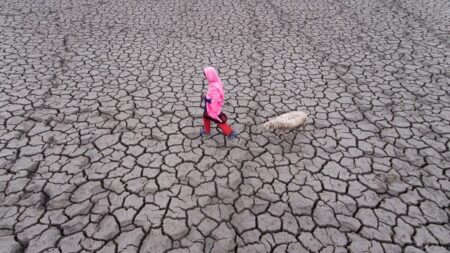A controversy over meat consumption cannot be even thought of over a picturesque region nestled amidst the mighty Himalayas, Himachal Pradesh which has long been renowned for its breathtaking landscapes, serene mountain villages, and vibrant cultural heritage. However, recent years have witnessed a disquieting trend as the state grapples with a surge in landslides and cloudbursts, causing substantial loss of life and property.
Amidst this environmental crisis, a controversial figure has emerged at the forefront, stirring up a storm of debate and emotions. Laxmidhar Behera, the Director of the prestigious Indian Institute of Technology (IIT) Mandi, has made headlines with his audacious claim that meat consumption may be directly linked to these calamities.
A Heated Controversy Unfolds
The tranquil state of Himachal Pradesh found itself engulfed in controversy when Laxmidhar Behera, a respected figure in academia, addressed a gathering at a seminar on environmental conservation.
His assertion that meat consumption might be a contributing factor to the recurring landslides and cloudbursts left many both astounded and skeptical. The claim, while audacious, reignited a long-standing debate on the environmental impact of dietary choices.

Exploring the Meat-Landslide Connection
Behera’s argument hinges on the broader environmental footprint of the meat industry. He contends that activities associated with meat production, such as deforestation for livestock grazing and greenhouse gas emissions, might exacerbate the region’s vulnerability to natural disasters.
While Behera acknowledges the complexity of this issue, he passionately implored students to reconsider their dietary choices in light of grave concerns about the environment.
Public Outrage and Support
Behera’s statements have not gone unnoticed. Social media platforms have been abuzz with discussions, with some expressing disbelief and skepticism, while others have rallied behind his call for dietary change.
As expected, this controversy has elicited a strong emotional response from both supporters and critics.
The Intricate Relationship Between Environment and Dietary Choices
This controversy has unearthed a deeper question that transcends the immediate debate: the symbiotic relationship between environmental degradation and certain consumption patterns.
While this connection may not be immediately apparent, it raises profound concerns for environmentalists and researchers. The hidden impacts of environmental deterioration are now under scrutiny.
A History of Controversies
Laxmidhar Behera is no stranger to controversy. This incident marks another chapter in his history of making outspoken and thought-provoking statements. In a previous episode, he boldly asserted the existence of ghosts, recounting a chilling personal experience.
In another instance, he challenged conventional wisdom by suggesting that overeating, rather than hunger, is the primary cause of death for many individuals.
The Scientist’s Response
Ambrish Kumar Mahajan, a distinguished geologist and the Dean of the School of Earth and Environmental Sciences at the esteemed Central University of Himachal Pradesh, has stepped forward to address Behera’s claims.
Mahajan’s perspective provides a more comprehensive picture of the region’s geological and anthropogenic factors contributing to the natural disasters. He highlights tectonic plate movements, fragile ecology, heavy rainfall, and construction activities as key components of the problem.
While Mahajan acknowledges the need for responsible environmental practices, he refrains from directly engaging with Behera’s claims.
A Call for Informed and Responsible Discussions
As the controversy rages on, it underscores the pressing need for responsible and evidence-based discussions on environmental issues. Behera’s audacious claims, while stirring emotions and sparking debates, may not present the full picture.
Environmental problems, especially those as complex as landslides and cloudbursts, demand a multidisciplinary approach, incorporating the expertise of geologists, environmentalists, and meteorologists, among others.
The Role of Dietary Choices in Environmental Conservation
The controversy also brings to light the broader issue of how our dietary choices impact the environment. While the direct link between meat consumption and landslides may be tenuous, it is well-established that livestock farming is a significant contributor to deforestation, greenhouse gas emissions, and water pollution.
A shift toward more sustainable diets, such as plant-based options, can play a vital role in reducing the environmental footprint associated with food production.
Conclusion
The controversy surrounding Laxmidhar Behera’s assertion linking meat consumption to landslides and cloudbursts in Himachal Pradesh has ignited a fierce debate. While his statements may lack definitive scientific evidence, they have raised important questions about the environmental consequences of our dietary choices.
Responsible and informed discussions on this issue are essential as we grapple with the broader challenges of environmental conservation in the face of changing climate patterns and increasing natural disasters. It is a reminder that the choices we make in our daily lives can have far-reaching implications for the planet we call home.













